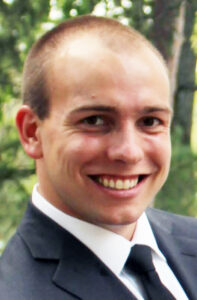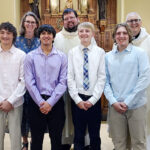By Patrick Schmadeke
While it might not be readily apparent, theology is worth studying because it is intrinsically valuable. It is like friendship, good books, sunsets and chocolate. We don’t ask why we have friends or why we watch sunsets. We just enjoy them because they are fundamentally good. We know that they enrich our lives in a way that cannot be measured. This is also why we do theology.

So, what is theology? Importantly, we should recognize that all people of faith do theology. We all do theology because we all talk about God. When we talk about God, we make claims about what God does or does not do in the world. These are theological claims. In his book “What Is Theology?” Father Edmond Dunn, a retired St. Ambrose University theology professor, writes: “to be touched by wonder and begin to ask the meaning of it all — that is what theology is all about” (P. 4).
Theology is worth doing for its own sake. But as it happens, when we integrate theology with other disciplines, those disciplines become enriched. Theology does not and should not stay self-contained; it spills over into every area of life.
When we add theology to healthcare we can be better ministers to those who are suffering because it helps us become fluent in the language of compassion. When we add theology to business our priorities move from focusing on profits to recognizing that businesses are stewards of economic systems — systems on which the well-being of people depend. When we add theology to public service or government we recognize that our efforts must be toward the common good, not the next election cycle. When we blend theology and ecology we stop seeking control of nature and instead choose to participate in God’s creation. In all disciplines, theology helps us to form a moral compass to guide our action and gives us the mental framework to transform systems into agents of good.
Theology also enriches our church. It helps us to explain the Scriptures, formulate our doctrine and to probe the mysteries of God that we have not yet come to recognize. It helps us understand our tradition and identifies the difference between a temporary local custom and a religious practice that is essential to our identity. It realizes that praying the Mass in a dead language is not the most authentic expression of God’s presence to us — “the sabbath was made for man, not man for the sabbath” (Mark 2:27). It realizes that we can discern the authentic voice of God calling to us in ways we are not used to hearing God speak.
Theology is so enriching because it brings to bear the one “in whom we live and move and have our being” (Acts 17:28). Theology tunes our ears so we can better listen to the God who beckons us to live more like Christ.
Perhaps “Why do theology?” might have been a more appropriate title to this column. After all, it would seem that theology is more a verb than it is a noun. It’s not only in the head; it’s also in the heart. We have to walk rightly and talk rightly. This is good theology — it looks joy and suffering in the face and seeks to account for their presence. It sees things as they are, asks how they should be and creates space for the kingdom of God to become present to us. We should all be doing more theology these days. If you do this more intently, you never know how much it might enrich your life. Just one word of warning — you might be surprised, even offended, by what you find. In the end we will be all the better for it.
(Patrick Schmadeke, 27, is a graduate of St. Ambrose University (‘13) and a student in the Master of Divinity program at the University of Notre Dame. His column offers reflections on his coursework, engaging with the richness of the Catholic tradition and its relevance to the world today.)











